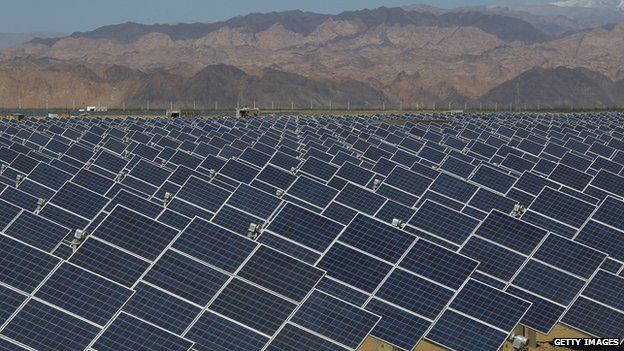China ‘deserves more credit’ for renewable energy effort
- Published

China should be given more credit for its investment in clean electricity, the head of the International Energy Agency says.
Maria van der Hoeven says most people think that China is frantically building coal-fired power stations.
The reality, she says, is that China is spending as much as the US and Europe put together on clean power.
She says its coal-fired power stations are state of the art - and should be copied in other developing countries.
Maria van der Hoeven told BBC News: "People think about China in a way more representative of previous decades.
"They are now the largest wind power market in the world. They have increased their power generation from renewables from really nothing 10 years ago - and now it's 25%. These are very important signals that China is moving into the right direction."
Her organisation - the rich countries' energy think-tank - says in 2014 that China spent more than $80bn in new renewables generating capacity; higher than the EU ($46bn); Japan ($37bn) and the USA ($34bn).
China's commitment to renewables has benefited the rest of the world by creating a mass market that prompted a 70% reduction in the cost of solar panels in recent years.
Paris summit
The country is also building 50 new nuclear power stations and creating economies of scale in nuclear too, the IEA says, at a time when the industry is moribund in Europe.
Ms van der Hoeven's comments come in the week that China is expected formally to declare its climate change pledge in preparation for the UN climate summit in Paris in December.
Last year the nation reported that its emissions had fallen by 1% as coal use slumped.
Ms van der Hoeven said China was still investing heavily in coal-fired power plants, but that the power stations were highly efficient and enabled old inefficient plants to be retired.
This was an example to some other developing nations that still used much less efficient technology, she added.
The IEA says if other nations can be persuaded to use better technology to improve performance by just a few percentage points, it would equal the entire carbon reductions effort from the EU.
But despite its admiration for China's achievement, the IEA is still critical of what it says is the nation's lack of transparency on data.
And it says that because of China's vast size and its growing wealth, the country's emissions are expected by 2030 to be two and a half times higher than the next bigger emitter, the US.
Follow Roger on Twitter @rharrabin
- Published11 March 2015